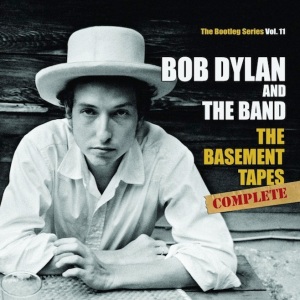By Raoul Biron, Contributing Writer

Released on Nov. 4, the “Basement Tapes Complete” reveals another side of Dylan’s contribution to music.
Bob Dylan is never content. The 73-year-old songwriter forces his audience to adapt. Even at the cost of alienating his listeners forever, Dylan unceremoniously drags his fans through genres, leaving behind enough innovation, hurt feelings and material to overwhelm them. Dylan is scheduled to follow his latest album, “Tempest” (2012) with “Shadows in the Night” early next year.
Regardless of how Dylan rages on with his “never ending tour” and what new version of himself is unveiled with his 35th album, it’s his listeners, former colleagues and historians that dig through the rubble and piece together the works that show us his true impact. Dylan’s almost inexhaustible supply of new material and nearly constant touring schedule resulted in a flood of bootlegged work, recording his development from as early as 1950’s “Minnesota,” through to his going electric and even modern studio outtakes. Fans and record labels alike jumped on any recordings and fought for ownership, leaving some crucial moments in American musical history still incomplete. On Nov. 4, Columbia Records released arguably the most important of these remaining collections with “The Bootleg Series Vol.11: The Basement Tapes Complete.”
Dylan went electric in 1965, wrecked his motorcycle in 1966 and was withdrawn to his rural New York home by 1967. Borrowing equipment from Peter, Paul and Mary and slowly incorporating members of the Hawks (what would later become The Band), Dylan began developing a dirty and unfinished collection of songs. An audience now having been exposed to the brash weirdness of “Sgt. Peppers,” psychedelia coming into full swing and rock ‘n’ roll evolving into a much more complex mesh of stylistic approaches and depths, began to grow hungry for the songwriters new work. As pressure began to mount around Dylan to release or at least re-record his demos, it became clear that this project wasn’t actually designed for himself. Peter, Paul and Mary cracked the Top 40 with a “Basement” song first, followed by Manfred Mann reaching number one in the UK, and the Byrds covering Dylan’s demos.
Listeners will note the “Basement Tapes” aesthetic problems early on. This collection is very honestly flawed and raw. While the cutting edge of the music industry began to take bigger and more obvious risks, Dylan’s gambles and experiments in “Basement Tapes” feel more tactile. Whether he stretches a Hank Williams cover as far as it can go or he falls flat and fails to sell an old traditional, these live demos take their leap of faith together with the audience.
With the lack of any of the traditional safety nets (seamless production, multiple tracks, thorough rehearsal) in a time when bands first began spending months in the studio, finding a winning track on “The Basement Tapes” feels massive. While battling constant analogue ground noise, borderline dysfunctional jams and some truly incomplete- feeling songs, it can take a while for the listener to realize some of the true weight behind this collection. Sifting through the massive track list, the audience is forced to find the magic in hearing more of the gist or basic framework of a song, instead of a complete package. It feels almost like peeking behind a curtain when tracing a rock ‘n’ roll classic to a hissing or droning tape from a house in West Saugerties, New York.
“The Bootleg Series Vol. 11: Basement Tapes Complete” brings you the sound of the room in which the song was created, and its tracks succeed most when seen as scribbles and notes instead of a novel. Letting yourself enjoy this missing jigsaw puzzle in Dylan and The Band’s career can be difficult at times, but hearing the beginnings of the shift in music which would impact mainstream rock ‘n’ roll, the new era of folk and even paving the way for alt-country is both fascinating and rewarding. While a listener must piece together their own relationship to the material, and in some ways, even struggle with it, there has never been a more direct and unadulterated line from Bob Dylan’s brain to the audience’s ears than “The Basement Tapes.”




















